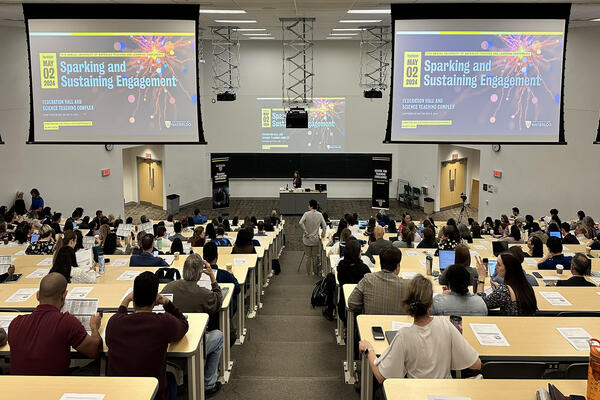Professor Paul Craig, from the Faculty of Science at the University of Waterloo, will receive a grant of $120,000 from the John R. Evans Leaders Fund for his research on the long-term impact of anti-depressants and climate change on fish populations. This work is in collaboration with Barb Katzenback, a Banting postdoctoral fellow from the Department of Biology at Waterloo.
Even low doses of pharmaceuticals in aquatic environments can significantly impact the health of Canadian fish species. Research shows that in combination with warming temperatures, contaminant exposure of fish can exacerbate the non-genetic modifications that occur, and these characteristics of exposure can be passed on to their offspring through non-genetic inheritance, also known as epigenetics.
"Aquatic species, such as fish, can act as sentinels for the health and sustainability of Canadian waterways for the population at large," said Craig, a professor in Waterloo's Department of Biology. "By taking an epigenetic approach, we can examine the long-term impact of contaminants across multiple generations of fish."
The researchers will measure the multi-generational effect of these contaminants by measuring the non-genetic traits — those caused by an animal's environment — that they pass on to subsequent generations. Since clean drinking water is of direct importance to global health, this research may inform policies on limiting aquatic contamination and sustaining reliable sources of drinking water.
Three other researchers from Waterloo are also receiving JELF grants from CFI to help cover infrastructure costs to support their cutting-edge research. Those researchers, their projects and funding included in today's announcement are:
- Amir Keyvan Khandani, professor in the Department of Electrical and Computer Engineering — Infrastructure for 5G wireless cellular networks and Internet of Things: $75,000.
- Praveen Nekkar Rao, professor in the School of Pharmacy — State-of-the-art technology to discover new therapies to treat Alzheimer’s disease: $26,800.
- Ben Thompson, professor in the School of Optometry and Vision Science — Exploring non-invasive stimulation to treat and improve vision for those with impairments from brain injury or abnormal brain development: $100,000.
“The CFI’s John R. Evans Leaders Fund is about remarkable people, and the latest recipients of this fund are no exception,” said Gilles Patry, president and CEO of the Canada Foundation for Innovation. “By equipping world-class researchers with state-of-the-art tools, Canada remains a global competitor in areas that matter to people in communities around the country.”
The John R. Evans Leaders Fund was developed to help Canadian universities attract and retain top research talent. More information on the awards and the Canada Foundation for Innovation is available on the CFI website.








